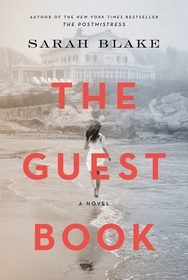 Sarah Blake’s long-awaited new novel, following THE POSTMISTRESS in 2010, is now in stores. THE GUEST BOOK revolves around three generations of a well-bred family who summer on an island that they own off the coast of Maine. In this heartwarming and moving blog post, Sarah explains how her mother influenced her to become such a voracious reader. She recalls some of the books published in the 1930s and ’40s that her mother read as a child and then passed along to her --- and the enormous impact these titles have had on her as a writer of historical fiction.
Sarah Blake’s long-awaited new novel, following THE POSTMISTRESS in 2010, is now in stores. THE GUEST BOOK revolves around three generations of a well-bred family who summer on an island that they own off the coast of Maine. In this heartwarming and moving blog post, Sarah explains how her mother influenced her to become such a voracious reader. She recalls some of the books published in the 1930s and ’40s that her mother read as a child and then passed along to her --- and the enormous impact these titles have had on her as a writer of historical fiction.
My mother died before I became a mother myself, so the double thread I've seen and envied my friends for having was cut before I had a chance to be both child and mother. Often I've wondered what it would have been like along the way to be able to pick up the phone and ask, What do I do? And hear back the reassurance, the implicit oh, yes I've been there, the passing on of the mix of confusion, bemusement and joy, sharing the absurdities, the boredom, the worry, laying in the habits of mind and heart that grow strong parents.
But that is fantasy. Even had she been alive, my mother wouldn't have been that mother. She had no idea about children's natures, or how to raise them. She loved us, she saw that we were fed and clothed, but my mother was a vague, lovely presence who never took, as they say. Took root, I suppose, is what is meant by that. Not grounded, to follow that metaphor right into its hole. So I have no words of wisdom from her, no edicts born of experience, or her engagement with the world.
 What I do have, all around me, are her books. Especially her childhood books from the ’30s and ’40s, the books she grew up with and loved, and passed along --- well-read and battered --- to me. And though I don't remember my mother ever reading her books to me, I do remember lying on a couch --- and being left to do so --- luxuriously left alone to read and read and read. BABY ISLAND, HOUSEBOAT SUMMER, THE COUNTERPANE FAIRY, SWALLOWS AND AMAZONS, THE BORROWERS --- stories of escape and survival, and of brave, competent boys and girls --- a primer of expectations for children in the pre-World War II era. Old-fashioned, yes. And deliciously strange.
What I do have, all around me, are her books. Especially her childhood books from the ’30s and ’40s, the books she grew up with and loved, and passed along --- well-read and battered --- to me. And though I don't remember my mother ever reading her books to me, I do remember lying on a couch --- and being left to do so --- luxuriously left alone to read and read and read. BABY ISLAND, HOUSEBOAT SUMMER, THE COUNTERPANE FAIRY, SWALLOWS AND AMAZONS, THE BORROWERS --- stories of escape and survival, and of brave, competent boys and girls --- a primer of expectations for children in the pre-World War II era. Old-fashioned, yes. And deliciously strange.
BABY ISLAND, published in 1937, may be one of the weirdest books for girls I've ever read, for instance, and especially when read through the lens of our post-Handmaid world. Still, I loved the story of the Wallace sisters, ages 10 and 8, who are travelling alone on a steamship towards their father in Australia. In the first chapter, they realize that the ship they are on is sinking, so they rescue four babies from the ship, pop into a lifeboat and soon find themselves in the middle of the Indian Ocean, without a grown-up in sight. Eventually, they make their way to a desert island and set up camp. Adventures ensue, as they must. But imagine, this is a desert island fantasy --- with babies. Robinson Crusoe's nursery.
Reading on that couch, I took in old stories like that, the stories my mother loved and wanted me to love as well. But I also see, rereading the first chapter of HOUSEBOAT SUMMER by Elizabeth Coatsworth, for instance, how much I took in the language of that time. It's no wonder, I think now, that one of the great joys I take in writing historical fiction is the chance to slip into an earlier diction, into past cadences and try them on, wrap them around my own sentences and take them for a spin. My mother's books were the clothes in her closet I stole in to try.
And, as I finished each of them, I slid them in beside the new books, books of the ’60s, given to me in my first 10 years --- THE WOLVES OF WILLOUGHBY CHASE, LITTLE HOUSE IN THE BIG WOODS --- their provenance carefully identified in her tiny, correct lettering: For Sarah, from Granny Blake, December 1964. From Aunt Priss, From Johnny. On the bookshelf in my bedroom grew the record of my reading, shelved and registered. Surrounding me. She was my first librarian. The first person to say, Here, try this. And now, I see, I did.







